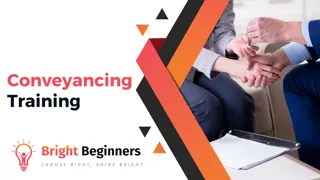
Conveyancing Essentials: Standard Operations and Taxation Insights
Boost Your Skills In No Time! Freebies (Digital Certificate & Student ID Card) | Exam Not Required | 24/7 Expert Support
Bright Beginners
Summary
- Reed Courses Certificate of Completion - Free
- Tutor is available to students
Add to basket or enquire
Overview
The Conveyancing course offers a comprehensive exploration of the intricate legal processes and practices involved in property transactions. With a curriculum designed to cover a range of topics, from property law to accounting procedures and taxation concerns, this course equips individuals with the knowledge and skills necessary to navigate the complex world of property conveyancing. In a society where property transactions are a cornerstone of economic activity, understanding the legal intricacies of conveyancing is essential for both aspiring professionals and individuals seeking to engage in property transactions with confidence.
Property transactions constitute a significant portion of the UK's economy, with the residential property market alone valued at £7.3 trillion. The Conveyancing course empowers individuals to participate in these transactions with a solid grasp of legal obligations, ensuring smooth and legally compliant processes. In a landscape where legal compliance and consumer protection are paramount, this course is invaluable for legal professionals, property agents, and anyone involved in property transactions.
Learning Outcomes:
Upon completing the course, participants will be able to:
- Understand the fundamental principles and practices of property conveyancing.
- Apply property law knowledge to various aspects of conveyancing operations.
- Navigate Land Registry procedures and stay updated on relevant laws.
- Analyse landlord and tenant relationships within the context of conveyancing.
- Execute standard conveyancing operations, including drafting contracts and title searches.
Curriculum
-
Module 01: An Overview of Conveyancing 12:58
-
Module 02: Delving into Property Law and Conveyancing Practices 12:30
-
Module 03: Updates on Land Registry and Relevant Laws 23:43
-
Module 04: Navigating Landlord and Tenant Relationships 18:33
-
Module 05: Standard Conveyancing Operations 15:25
-
Module 06: Accounting Procedures for Conveyancing Transactions: A Guide 13:37
-
Module 07: Addressing Taxation Concerns in Conveyancing 21:52
Course media
Description
Those who strive to enhance their skills while preparing for a specific employment opportunity can consider the course! This course will keep you up to date on the most important amendments and will instruct you accordingly. So, if you want the best instruction available, you can put your money on this course.
Here is the curriculum breakdown of this course:
- Module 01: An Overview of Conveyancing
Introduces the foundational concepts of property conveyancing and its importance. - Module 02: Delving into Property Law and Conveyancing Practices
Explores property law essentials and their application in conveyancing transactions. - Module 03: Updates on Land Registry and Relevant Laws
Provides insights into Land Registry procedures and the latest legal developments. - Module 04: Navigating Landlord and Tenant Relationships
Analyses legal considerations in landlord and tenant relationships during conveyancing. - Module 05: Standard Conveyancing Operations
Covers key operations such as title searches, drafting contracts, and property transfers. - Module 06: Accounting Procedures for Conveyancing Transactions: A Guide
Examines financial aspects of conveyancing, including funds handling and procedures. - Module 07: Addressing Taxation Concerns in Conveyancing
Explores taxation implications and considerations in property conveyancing.
Get Your Certificate
Once you complete the course, you will be eligible to download a digital certificate from Reed for free.
Who is this course for?
Anyone interested or curious about Conveyancing, can enrol in this course to further understand the subject.
Requirements
There are no specific requirements for enrolment in the course, making it accessible to all individuals.
Career path
Graduates of the course can pursue various roles within legal and property sectors, with potential salaries including:
- Conveyancing Paralegal: £18,000 - £25,000
- Licensed Conveyancer: £25,000 - £40,000
- Property Lawyer: £30,000 - £50,000
- Land Registry Officer: £25,000 - £35,000
- Property Manager: £25,000 - £40,000
Questions and answers
Currently there are no Q&As for this course. Be the first to ask a question.
Certificates
Reed Courses Certificate of Completion
Digital certificate - Included
Will be downloadable when all lectures have been completed.
Reviews
Currently there are no reviews for this course. Be the first to leave a review.
Legal information
This course is advertised on reed.co.uk by the Course Provider, whose terms and conditions apply. Purchases are made directly from the Course Provider, and as such, content and materials are supplied by the Course Provider directly. Reed is acting as agent and not reseller in relation to this course. Reed's only responsibility is to facilitate your payment for the course. It is your responsibility to review and agree to the Course Provider's terms and conditions and satisfy yourself as to the suitability of the course you intend to purchase. Reed will not have any responsibility for the content of the course and/or associated materials.


